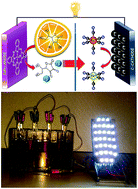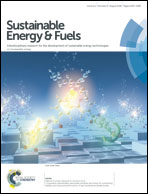A vitamin C fuel cell with a non-bonded cathodic interface†
Abstract
Vitamin C is a naturally occurring molecule with antioxidant properties, and it often plays a pivotal role in many chemical and biochemical processes. We show that a cobalt-based molecular electrocatalyst can mediate the electron donation from vitamin C which upon coupling with a non-bonded and reversible electron acceptor; the electron flow between the half cells can be channeled in a precious-metal-free configuration. The non-bonded nature of the electron acceptor allows fast interfacial kinetics even on simple carbon particles and arrests the cathode-derived parasitic chemistry often encountered in oxygen breathing fuel cells. Consequently, a vitamin C fuel cell driven by the non-bonded cathodic interface demonstrates ∼18 times higher performance metrics compared to the precious-metal-based vitamin C–O2 configuration. Due to the renewable nature of the fuel and the precious metal-free configuration in the proposed non-bonded architecture, the cell can noticeably reduce the cost of electricity per kW with potential practical applications in powering commercial electrical appliances.



 Please wait while we load your content...
Please wait while we load your content...